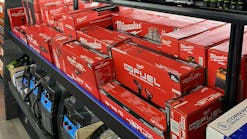Every weekday approximately 7,600 mobile jobbers for the four major mobile brands and 2,000 to 3,000 independent jobbers hit the streets selling their cool tools and equipment. With most jobbers making about 10 stops each day, a good guess is that there are about 100,000 vehicle repair location sales calls on every weekday.
This year's PTEN Aftermarket Profile shows that 75 percent of shops have six or fewer technicians, so let’s say the average is three. This means the total number of daily sales calls on vehicle repair technicians is 300,000. That’s an astounding number of sales interactions selling tools and equipment. Certainly, my numbers are not 100 percent accurate. The actual could be lower or higher but, no matter what, it is a lot of opportunities to go sell something.
If you think about it, each of those 100,000 shops and dealerships that are being visited purchase a great deal of products other than basic tools and equipment. This includes compressors, lifts, lubricants, alignment systems, and even used equipment.
Now, I’m not going to suggest that you start carrying those non-tool and equipment items, but I am suggesting that you bird dog (spot opportunities for) these items for the manufacturers and brokers who do sell them.
As a kid growing up in the country, we hunted small game like pheasants and rabbits. But in Pennsylvania a youngster could only get their own hunting license at the age of 12. So, at 9 or 10 years old your dad would convince you that pretending to be a bird dog and running through the brush flushing out the wildlife would be lots of fun. This was the way you could earn your stripes and hang out with the adults. Somehow running through all the crapola and coming home filthy dirty, tired, and covered with scratches seemed great back then.
The point of this memory is that as kids we were bird dogging hunting opportunities for the older guys with the guns and there is no reason you can’t do the same for the suppliers of other goods that are purchased by your customer shops — and make a little money on the side.
How to bird dog
Step 1: Contact the sales agency for some of the capital equipment that you don’t sell. Normally this will be a manufacturer’s representative agency who represents several non-competing capital equipment manufacturers. I bet you already know a few of these salespeople since they call on the same shops you do, just not very often. Find out who the actual salesperson is in your area and set up a breakfast or lunch with them.
Step 2: At that meeting explain that you make 50+ stops each week at the shops that purchase not only your products but their products also. And that during your calls you sometimes hear or even get asked about suppliers of OEM and used equipment. Explain that if for instance you are calling on a shop that is having problems with their lifts or other equipment you can ask the manager/owner if it would be alright for you to have the salesperson from the lift company you know give them a call. This is bird dogging a sale. Another example could be that you know a technician who is setting up his own shop and is going to need some of the products they sell.
Step 3: Now ask the OEM salesperson if you could receive a bird dogging commission for any leads that result in a sale that you send their way. This is not illegal, this is not sneaky, this is not underhanded — it is just a business deal. You are a private businessperson making an arrangement with another businessperson.
Step 4: Assuming you come to an agreement be sure to get it in writing what your finder’s fee percentage or flat fee will be. An email chain is a great way to get it in writing. Most manufacturers’ representatives make seven percent to 15 percent commission, so a few points of that would be logical.
Step 5: Keep your ears and eyes open to opportunities for your quasi sales partner to sell something. Do not do the selling for him since you probably don’t know the finer points of their equipment and certainly don’t know the pricing. Simply pay attention to what’s happening and is said around you. If you know of a shop that is closing, a company who buys used equipment would be happy to know that too.
An arrangement like this can help you in several ways. Firstly, you can make a few extra bucks and as you begin bird dogging these sales, your regular tool customers will begin to look upon you as not just a tool salesperson but also as an industry expert. Anytime you can present yourself as an overall industry expert you become move valued as someone people will want to do business with.
If you are one of the totally independent mobile jobbers I mentioned earlier, you may be able to secure some OEM capital equipment lines to sell in your territory. This is possible as a manufacturer’s representative sub-rep or an actual salesperson for the manufacturer. Just be sure you understand what will be expected of you and how you will be paid. Remembering that your tools and equipment business is your primary income maker, so you don’t want to lose sight of that. Selling capital equipment is somewhat different than selling tools and equipment to working technicians. The profit margins are lower than your normal ones but the dollar volume is much higher so the money can be excellent.
As you are setting up your presentation, be very sure that you are speaking to the decision maker. A shop foreman at a dealership certainly has an influence on a purchase but the general manager, or maybe even the owner, makes those decisions. An easy way to ensure you are presenting to the decision maker is to ask your contact this question. “Is there anyone else, in addition to you who will be involved in making the decision on this purchase?” If your contact says no, they are the only one just say something like, "So if you see something you like today you can make the purchase?”
If your contact says that the owner or general manager will be involved, then ask to have them at the presentation so you can answer any of their questions on the spot. This line of questions and answers gives your contact a gracious way to let you know they are or are not able to make this decision. You can also expect the decision maker to require a formal quotation and they will probably get competitive bids as well.
With a little bit of thought and networking, bird-dogging for others is a nice way to put a little extra in your pocket.
Now go sell and bird-dog something.



